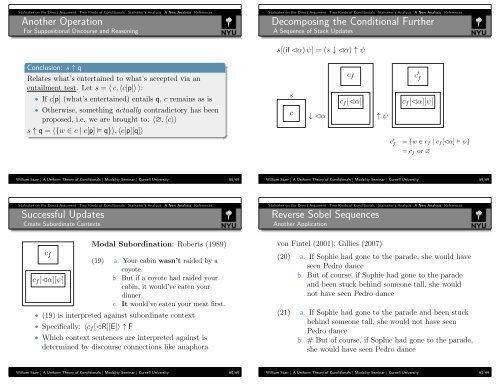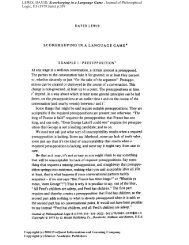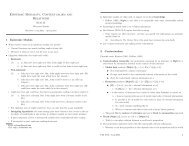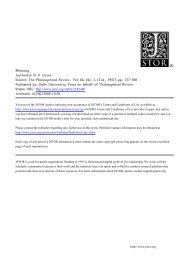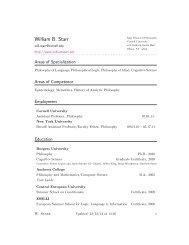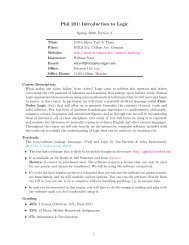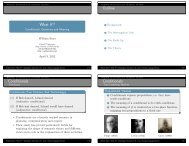A Uniform Theory of Conditionals: Beyond Stalnaker - Will Starr
A Uniform Theory of Conditionals: Beyond Stalnaker - Will Starr
A Uniform Theory of Conditionals: Beyond Stalnaker - Will Starr
Create successful ePaper yourself
Turn your PDF publications into a flip-book with our unique Google optimized e-Paper software.
<strong>Stalnaker</strong> on the Direct Argument Two Kinds <strong>of</strong> <strong>Conditionals</strong> <strong>Stalnaker</strong>’s Analysis A New Analysis References<br />
Another Operation<br />
For Suppositional Discourse and Reasoning<br />
<strong>Stalnaker</strong> on the Direct Argument Two Kinds <strong>of</strong> <strong>Conditionals</strong> <strong>Stalnaker</strong>’s Analysis A New Analysis References<br />
Decomposing the Conditional Further<br />
A Sequence <strong>of</strong> Stack Updates<br />
s[(if ✁α) ψ] = (s ↓ ✁α) ↑ ψ<br />
Conclusion: s ↑ q<br />
Relates what’s entertained to what’s accepted via an<br />
entailment test. Let s = 〈 c, 〈c[p]〉 〉:<br />
• If c[p] (what’s entertained) entails q, c remains as is<br />
• Otherwise, something actually contradictory has been<br />
proposed, i.e. we are brought to: 〈∅, 〈c〉〉<br />
s<br />
c<br />
↓ ✁α<br />
c f<br />
c f [⊳α]<br />
c f [⊳α][ψ]<br />
↑ ψ<br />
c ′ f<br />
s ↑ q = 〈{w ∈ c | c[p] q}〉, 〈c[p][q]〉<br />
c ′ f<br />
= {w ∈ c f | c f [✁α] ψ}<br />
= c f or ∅<br />
<strong>Will</strong>iam <strong>Starr</strong> | A <strong>Uniform</strong> <strong>Theory</strong> <strong>of</strong> <strong>Conditionals</strong> | Modality Seminar | Cornell University 58/69<br />
<strong>Will</strong>iam <strong>Starr</strong> | A <strong>Uniform</strong> <strong>Theory</strong> <strong>of</strong> <strong>Conditionals</strong> | Modality Seminar | Cornell University 59/69<br />
<strong>Stalnaker</strong> on the Direct Argument Two Kinds <strong>of</strong> <strong>Conditionals</strong> <strong>Stalnaker</strong>’s Analysis A New Analysis References<br />
Successful Updates<br />
Create Subordinate Contexts<br />
<strong>Stalnaker</strong> on the Direct Argument Two Kinds <strong>of</strong> <strong>Conditionals</strong> <strong>Stalnaker</strong>’s Analysis A New Analysis References<br />
Reverse Sobel Sequences<br />
Another Application<br />
c f<br />
c f [⊳α][ψ]<br />
Modal Subordination: Roberts (1989)<br />
(19) a. Your cabin wasn’t raided by a<br />
coyote.<br />
b. But if a coyote had raided your<br />
cabin, it would’ve eaten your<br />
dinner.<br />
c. It would’ve eaten your meat first.<br />
• (19) is interpreted against subordinate context<br />
• Specifically: 〈c f [✁R][E]〉 ↑ F<br />
• Which context sentences are interpreted against is<br />
determined by discourse connections like anaphora<br />
von Fintel (2001); Gillies (2007)<br />
(20) a. If Sophie had gone to the parade, she would have<br />
seen Pedro dance<br />
b. But <strong>of</strong> course, if Sophie had gone to the parade<br />
and been stuck behind someone tall, she would<br />
not have seen Pedro dance<br />
(21) a. If Sophie had gone to the parade and been stuck<br />
behind someone tall, she would not have seen<br />
Pedro dance<br />
b. # But <strong>of</strong> course, if Sophie had gone to the parade,<br />
she would have seen Pedro dance<br />
<strong>Will</strong>iam <strong>Starr</strong> | A <strong>Uniform</strong> <strong>Theory</strong> <strong>of</strong> <strong>Conditionals</strong> | Modality Seminar | Cornell University 60/69<br />
<strong>Will</strong>iam <strong>Starr</strong> | A <strong>Uniform</strong> <strong>Theory</strong> <strong>of</strong> <strong>Conditionals</strong> | Modality Seminar | Cornell University 61/69


